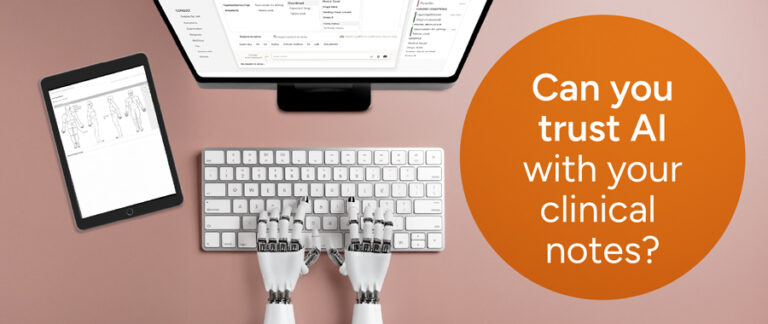
Can you trust AI with your clinical notes?
You didn’t go into medicine to spend your evenings typing up notes, but in a typical private practice, that’s exactly what many doctors find themselves doing, often hours after the last patient has left. The admin burden has become a leading driver of burnout in the profession. So it’s no surprise that AI-powered note-taking tools are gaining traction, promising to save time, reduce admin, and make doctors more present during consultations.
While the benefits are real, not all AI tools are created equal. As adoption accelerates, it’s important to understand the risks, regulations, and key considerations before using AI to turn conversations into clinical records.
Let’s unpack what you need to know.
AI is changing how doctors work
In 2025, around 31% of hospitals and private practices had piloted or adopted AI tools for clinical documentation. Usage is expected to increase significantly in 2026, as more practitioners look for ways to reclaim their time.
Leading healthcare systems like Kaiser Permanente have already used AI scribes in over 2.5 million patient encounters. Doctors report reduced documentation time, improved patient interaction, and fewer late-night admin hours.
The technology typically combines voice-to-text transcription with natural language processing (NLP) to:
- Transcribe real-time conversations
- Structure and summarise content into usable notes
- Generate SOAP notes automatically
- Integrate with EMR or practice management systems
With the right tool, AI becomes a clinical co-pilot, not a replacement. It helps you stay focused in the consult room while reducing the pressure after hours.
Not all AI scribes are safe for healthcare
The growing interest in AI note-taking has led to an explosion of apps and tools claiming to streamline note-taking for doctors. However, many of these were built for general note-taking, not for regulated medical environments.
Here are some risks to look out for:
- Poor accuracy
Generic AI may misunderstand medical terminology, abbreviations, or accents, which could result in critical errors in your patient records. - No medical context
Without healthcare-specific training, the AI may produce notes that lack clinical relevance, coherence, or structure. - Data privacy concerns
Tools not designed for healthcare may store data in unsecured locations, breaching privacy laws or ethical standards. - Legal risk
Incorrect, incomplete, or unverifiable records could put your HPCSA compliance and medicolegal protection at risk. - Poor integration
If the AI tool doesn’t work with your existing systems, it can cause duplication of effort, not reduce it.
Understand the regulatory landscape
South African private practitioners must comply with several regulations when capturing, storing, and sharing patient data. These include:
- HPCSA ethical guidelines for record keeping and patient confidentiality
- POPIA (Protection of Personal Information Act) for data security
- Medical scheme requirements for claimable documentation
Any AI note-taking tool you use must align with these standards. That means:
- Secure, local data storage or POPIA-compliant cloud services
- Audit trails and version control for notes
- Ability to review and approve output before it’s finalised
- Clear accountability: the tool should support your clinical decisions, not make them
If you’re unsure, choose a trusted partner with proven healthcare expertise who can help you navigate compliance.
What to look for in a healthcare-grade AI tool
If you’re ready to explore AI note-taking, here are some features to look for:
- Built for clinical use
Choose a solution that was designed with medical professionals, not adapted from general business tools. - High transcription accuracy
Ensure the tool understands South African colloquialisms, medical terms, and diagnostic codes. - Human-in-the-loop
You should always be able to review, edit, and approve your notes before they become part of the record. - Integration-ready
Look for seamless integration with your EMR, billing, or practice management system to avoid duplication. - Compliance & security
Data must be encrypted, stored securely, and handled in accordance with POPIA and HPCSA requirements.
Empowering smarter practice with AI
AI note-taking has the potential to transform how doctors work. Done right, it reduces admin, improves accuracy, and gives you more time with patients. But like any clinical tool, it needs to be safe, fit-for-purpose, and supported by the right systems.
At Healthbridge, we support the responsible use of AI in private practice. We believe in tools that are designed with real clinicians, comply with local regulations, and make your practice more efficient, not more complicated.
Contact Healthbridge to book a free practice health assessment with one of our experienced Business Consultants. Let’s explore how smart, safe AI can support your practice’s success.
